| Listing 1 - 10 of 22 | << page >> |
Sort by
|
Book
ISBN: 3030212904 3030212890 Year: 2019 Publisher: Cham : Springer International Publishing : Imprint: Springer,
Abstract | Keywords | Export | Availability | Bookmark
 Loading...
Loading...Choose an application
- Reference Manager
- EndNote
- RefWorks (Direct export to RefWorks)
This book constitutes the refereed proceedings of the 31st International Conference on Advanced Information Systems Engineering, CAiSE 2019, held in Rome, Italy, in June 2019. The 41 full papers presented in this volume were carefully reviewed and selected from 206 submissions. The book also contains one invited talk in full paper length. The papers were organized in topical sections named: information system engineering; requirements and modeling; data modeling and analysis; business process modeling and engineering; information system security; and learning and mining in information systems. Abstracts on the CAiSE 2019 tutorials can be found in the back matter of the volume.
Artificial intelligence. --- Software engineering. --- Computer science. --- Computer security. --- Information Systems Applications (incl. Internet). --- Artificial Intelligence. --- Software Engineering. --- Mathematical Logic and Formal Languages. --- e-Commerce/e-business. --- Systems and Data Security. --- Informatics --- Science --- Computer privacy --- Computer system security --- Computer systems --- Computers --- Cyber security --- Cybersecurity --- Electronic digital computers --- Protection of computer systems --- Security of computer systems --- Data protection --- Security systems --- Hacking --- Computer software engineering --- Engineering --- AI (Artificial intelligence) --- Artificial thinking --- Electronic brains --- Intellectronics --- Intelligence, Artificial --- Intelligent machines --- Machine intelligence --- Thinking, Artificial --- Bionics --- Cognitive science --- Digital computer simulation --- Electronic data processing --- Logic machines --- Machine theory --- Self-organizing systems --- Simulation methods --- Fifth generation computers --- Neural computers --- Protection --- Security measures --- Computer-aided software engineering --- Application software. --- Mathematical logic. --- E-commerce. --- Cybercommerce --- E-business --- E-commerce --- E-tailing --- eBusiness --- eCommerce --- Electronic business --- Internet commerce --- Internet retailing --- Online commerce --- Web retailing --- Commerce --- Information superhighway --- Algebra of logic --- Logic, Universal --- Mathematical logic --- Symbolic and mathematical logic --- Symbolic logic --- Mathematics --- Algebra, Abstract --- Metamathematics --- Set theory --- Syllogism --- Application computer programs --- Application computer software --- Applications software --- Apps (Computer software) --- Computer software
Book
ISBN: 9783030212902 Year: 2019 Publisher: Cham Springer International Publishing :Imprint: Springer
Abstract | Keywords | Export | Availability | Bookmark
 Loading...
Loading...Choose an application
- Reference Manager
- EndNote
- RefWorks (Direct export to RefWorks)
Digital
ISBN: 9783540305781 Year: 2005 Publisher: Berlin Heidelberg Springer-Verlag GmbH
Abstract | Keywords | Export | Availability | Bookmark
 Loading...
Loading...Choose an application
- Reference Manager
- EndNote
- RefWorks (Direct export to RefWorks)
Computer science --- Programming --- Computer architecture. Operating systems --- Artificial intelligence. Robotics. Simulation. Graphics --- Computer. Automation --- programmeren (informatica) --- programmeertalen --- software engineering --- KI (kunstmatige intelligentie) --- computernetwerken --- robots
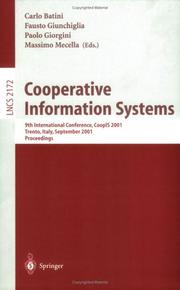
ISBN: 3540425241 3540447512 9783540425243 Year: 2001 Volume: 2172 Publisher: Berlin, Heidelberg : Springer Berlin Heidelberg : Imprint: Springer,
Abstract | Keywords | Export | Availability | Bookmark
 Loading...
Loading...Choose an application
- Reference Manager
- EndNote
- RefWorks (Direct export to RefWorks)
Information systems --- Distributed databases --- Computer networks --- International cooperation --- Computer Science --- Engineering & Applied Sciences --- Distributed data bases --- Distributed database systems --- Computer science. --- Computer communication systems. --- Database management. --- Information storage and retrieval. --- Multimedia information systems. --- Computer engineering. --- Computer Science. --- Database Management. --- Computer Engineering. --- Information Systems Applications (incl. Internet). --- Multimedia Information Systems. --- Computer Communication Networks. --- Information Storage and Retrieval. --- Databases --- Cyberinfrastructure --- Multimedia systems. --- Information storage and retrieva. --- Computer-based multimedia information systems --- Multimedia computing --- Multimedia information systems --- Multimedia knowledge systems --- Information storage and retrieval systems --- Data base management --- Data services (Database management) --- Database management services --- DBMS (Computer science) --- Generalized data management systems --- Services, Database management --- Systems, Database management --- Systems, Generalized database management --- Electronic data processing --- Information storage and retrieval systems. --- Automatic data storage --- Automatic information retrieval --- Automation in documentation --- Computer-based information systems --- Data processing systems --- Data storage and retrieval systems --- Discovery systems, Information --- Information discovery systems --- Information processing systems --- Information retrieval systems --- Machine data storage and retrieval --- Mechanized information storage and retrieval systems --- Computer systems --- Electronic information resources --- Data libraries --- Digital libraries --- Information organization --- Information retrieval --- Application software. --- Communication systems, Computer --- Computer communication systems --- Data networks, Computer --- ECNs (Electronic communication networks) --- Electronic communication networks --- Networks, Computer --- Teleprocessing networks --- Data transmission systems --- Digital communications --- Electronic systems --- Information networks --- Telecommunication --- Network computers --- Application computer programs --- Application computer software --- Applications software --- Apps (Computer software) --- Computer software --- Computers --- Distributed processing --- Design and construction --- Distributed databases - International cooperation - Congresses --- Computer networks - Congresses
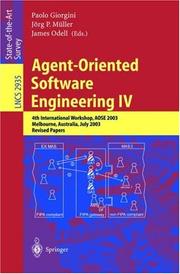
ISSN: 03029743 ISBN: 128030670X 9786610306701 3540246207 3540208267 Year: 2004 Volume: 2935 Publisher: Berlin, Heidelberg : Springer Berlin Heidelberg : Imprint: Springer,
Abstract | Keywords | Export | Availability | Bookmark
 Loading...
Loading...Choose an application
- Reference Manager
- EndNote
- RefWorks (Direct export to RefWorks)
The explosive growth of application areas such as electronic commerce, ent- prise resource planning and mobile computing has profoundly and irreversibly changed our views on software systems. Nowadays, software is to be based on open architectures that continuously change and evolve to accommodate new components and meet new requirements. Software must also operate on di- rent platforms, without recompilation, and with minimal assumptions about its operating environment and its users. Furthermore, software must be robust and autonomous, capable of serving a naive user with a minimum of overhead and interference. Agent concepts hold great promise for responding to the new realities of so- ware systems. They o?er higher-level abstractions and mechanisms that address issues such as knowledge representation and reasoning, communication, coor- nation, cooperation among heterogeneous and autonomous parties, perception, commitments, goals, beliefs, and intentions, all of which need conceptual mo- ling. On the one hand, the concrete implementation of these concepts can lead to advanced functionalities, e.g., in inference-based query answering, transaction control, adaptive work?ows, brokering and integration of disparate information sources, and automated communication processes. On the other hand, their rich representational capabilities allow more faithful and ?exible treatments of c- plex organizational processes, leading to more e?ective requirements analysis and architectural/detailed design.
Software engineering --- Intelligent agents (Computer software) --- Computer science. --- Software engineering. --- Logic design. --- Artificial intelligence. --- Engineering & Applied Sciences --- Computer Science --- Computer programming. --- Programming languages (Electronic computers). --- Computer logic. --- Computer Science. --- Software Engineering/Programming and Operating Systems. --- Software Engineering. --- Programming Techniques. --- Programming Languages, Compilers, Interpreters. --- Logics and Meanings of Programs. --- Artificial Intelligence (incl. Robotics). --- AI (Artificial intelligence) --- Artificial thinking --- Electronic brains --- Intellectronics --- Intelligence, Artificial --- Intelligent machines --- Machine intelligence --- Thinking, Artificial --- Bionics --- Cognitive science --- Digital computer simulation --- Electronic data processing --- Logic machines --- Machine theory --- Self-organizing systems --- Simulation methods --- Fifth generation computers --- Neural computers --- Computer science logic --- Logic, Symbolic and mathematical --- Computer languages --- Computer program languages --- Computer programming languages --- Machine language --- Languages, Artificial --- Computers --- Electronic computer programming --- Electronic digital computers --- Programming (Electronic computers) --- Coding theory --- Computer software engineering --- Engineering --- Informatics --- Science --- Programming --- Artificial Intelligence. --- Design, Logic --- Design of logic systems --- Digital electronics --- Electronic circuit design --- Logic circuits --- Switching theory
Book
ISBN: 9783540305781 Year: 2005 Publisher: Berlin Heidelberg Springer Berlin Heidelberg
Abstract | Keywords | Export | Availability | Bookmark
 Loading...
Loading...Choose an application
- Reference Manager
- EndNote
- RefWorks (Direct export to RefWorks)
The explosive growth of application areas such as electronic commerce, ent- prise resource planning and mobile computing has profoundly and irreversibly changed our views on software systems. Nowadays, software is to be based on open architectures that continuously change and evolve to accommodate new components and meet new requirements. Software must also operate on di?- ent platforms, without recompilation, and with minimal assumptions about its operating environment and its users. Furthermore, software must be robust and ¨ autonomous, capable of serving a naive user with a minimum of overhead and interference. Agent concepts hold great promise for responding to the new realities of software systems. They o?er higher-level abstractions and mechanisms which address issues such as knowledge representation and reasoning, communication, coordination, cooperation among heterogeneous and autonomous parties, p- ception, commitments, goals, beliefs, and intentions, all of which need conceptual modelling. On the one hand, the concrete implementation of these concepts can lead to advanced functionalities, e.g., in inference-based query answering, tra- action control, adaptive work?ows, brokering and integration of disparate inf- mation sources, and automated communication processes. On the other hand, their rich representational capabilities allow more faithful and ?exible treatments of complex organizational processes, leading to more e?ective requirements an- ysis and architectural/detailed design.
Computer science --- Programming --- Computer architecture. Operating systems --- Artificial intelligence. Robotics. Simulation. Graphics --- Computer. Automation --- programmeren (informatica) --- programmeertalen --- software engineering --- KI (kunstmatige intelligentie) --- computernetwerken --- robots
Book
Year: 2004 Publisher: Barcelona [publisher not identified].
Abstract | Keywords | Export | Availability | Bookmark
 Loading...
Loading...Choose an application
- Reference Manager
- EndNote
- RefWorks (Direct export to RefWorks)
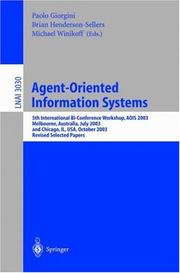
ISBN: 1280307765 9786610307760 3540259430 3540221271 Year: 2004 Publisher: Berlin, Heidelberg : Springer Berlin Heidelberg : Imprint: Springer,
Abstract | Keywords | Export | Availability | Bookmark
 Loading...
Loading...Choose an application
- Reference Manager
- EndNote
- RefWorks (Direct export to RefWorks)
This proceedings volume of the 5th AOIS Workshop is an opportunity for looking back at five years of organizing AOIS workshops. What did we achieve with the AOIS workshop series? Where were we five years ago, where are we now? Did our theme impact on the information systems field in the way that we had hoped for? AOIS workshops have taken place in Seattle, Heidelberg, Stockholm, Austin, Montréal, Interlaken, Toronto, Bologna, Melbourne, and Chicago, always in c- junction with a major conference on either multiagent systems in artificial - intelligence (AI/MAS) or information systems (IS). We have tried to innovate in holding these workshops as biconference events (each year AOIS held two wo- shop events, one at an AI/MAS conference and one at an IS conference), as well as using the AOIS web site as a medium for communication among researchers. So, certainly, we have reached a wide audience of researchers around the world from both the AI/MAS and IS communities. But did we also manage to build up a dedicated AOIS community? Five years ago, we wrote: “Agent concepts could fundamentally alter the nature of information systems of the future, and how we build them, much like structured analysis, ER modeling, and Object-Orientation has precipitated fundamental changes in IS practice. ” Of course, a period of five years is too short for evaluating the success or failure of a new scientific paradigm. But still we may observe that while most IS conferences meanwhile list agents as one of their many preferred topics, agent-orientation is generally not considered to be a fundamental IS paradigm.
Computer science. --- Computer Communication Networks. --- Information storage and retrieval systems. --- Information systems. --- Artificial intelligence. --- Management information systems. --- Computer Science. --- Artificial Intelligence (incl. Robotics). --- Information Systems Applications (incl.Internet). --- Information Storage and Retrieval. --- User Interfaces and Human Computer Interaction. --- Business Information Systems. --- Intelligent agents (Computer software) --- Object-oriented methods (Computer science) --- Artificial intelligence --- Engineering & Applied Sciences --- Computer Science --- Information technology. --- Business --- Computer communication systems. --- Information storage and retrieval. --- User interfaces (Computer systems). --- Information Systems Applications (incl. Internet). --- IT in Business. --- Data processing. --- Information storage and retrieva. --- Artificial Intelligence. --- IT (Information technology) --- Technology --- Telematics --- Information superhighway --- Knowledge management --- Informatics --- Science --- AI (Artificial intelligence) --- Artificial thinking --- Electronic brains --- Intellectronics --- Intelligence, Artificial --- Intelligent machines --- Machine intelligence --- Thinking, Artificial --- Bionics --- Cognitive science --- Digital computer simulation --- Electronic data processing --- Logic machines --- Machine theory --- Self-organizing systems --- Simulation methods --- Fifth generation computers --- Neural computers --- Automatic data storage --- Automatic information retrieval --- Automation in documentation --- Computer-based information systems --- Data processing systems --- Data storage and retrieval systems --- Discovery systems, Information --- Information discovery systems --- Information processing systems --- Information retrieval systems --- Machine data storage and retrieval --- Mechanized information storage and retrieval systems --- Computer systems --- Electronic information resources --- Data libraries --- Digital libraries --- Information organization --- Information retrieval --- Application software. --- Business—Data processing. --- Communication systems, Computer --- Computer communication systems --- Data networks, Computer --- ECNs (Electronic communication networks) --- Electronic communication networks --- Networks, Computer --- Teleprocessing networks --- Data transmission systems --- Digital communications --- Electronic systems --- Information networks --- Telecommunication --- Cyberinfrastructure --- Network computers --- Interfaces, User (Computer systems) --- Human-machine systems --- Human-computer interaction --- Application computer programs --- Application computer software --- Applications software --- Apps (Computer software) --- Computer software --- Distributed processing
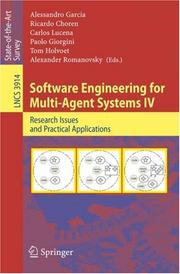

ISSN: 03029743 ISBN: 9783540335801 3540335803 3540335838 Year: 2006 Publisher: Berlin, Heidelberg : Springer Berlin Heidelberg : Imprint: Springer,
Abstract | Keywords | Export | Availability | Bookmark
 Loading...
Loading...Choose an application
- Reference Manager
- EndNote
- RefWorks (Direct export to RefWorks)
With the integration of computing and communication into the very fabric of our social, economic, and personal existence, the manner in which we think about and build software has become the subject of intense intellectual, scienti?c, and engineering reexamination. New computing paradigms have been proposed and new software architectures are being examined. The study of multi-agent s- tems (MAS) is one important movement energized by a growing awareness that application development may need to follow radically new paths. Fundamentally, MAS denotes a new software speci?cation and design paradigm. Moreover, when viewed in the context of large-scale deployment, it emerges as the embodiment of the quintessential concerns facing the software engineering community today. As computing and communication permeates the essential aspects of the societal infrastructure, software must become more nimble, slimmer, more natural, and more discrete. Software must integrate itself in an organic way into the activities it serves and the resources it exploits.
Software engineering --- Intelligent agents (Computer software) --- Génie logiciel --- Agents intelligents (logiciels) --- Congresses. --- Congrès --- Computer Science --- Engineering & Applied Sciences --- 681.3*D2 --- 681.3*I211 --- Software engineering: protection mechanisms; standards--See also {681.3*K63}; {681.3*K51} --- Distributed artificial intelligence: coherence and coordination; intelligent agents; languages and structures; multiagent systems --- Information Technology --- Software Engineering --- 681.3*D2 Software engineering: protection mechanisms; standards--See also {681.3*K63}; {681.3*K51} --- Software engineering. --- Computer software engineering --- Agents, Autonomous (Computer software) --- Agents, Cognitive (Computer software) --- Agents, Intelligent (Computer software) --- Assistants, Cognitive (Computer software) --- Assistants, Intelligent software --- Autonomous agents (Computer software) --- Cognitive agents (Computer software) --- Cognitive assistants (Computer software) --- IAs (Computer software) --- Intelligent agent software --- Intelligent software agents --- Intelligent software assistants --- Software agents (Computer software) --- Special agents (Computer software) --- Computer science. --- Computer communication systems. --- Computer programming. --- User interfaces (Computer systems). --- Artificial intelligence. --- Computer Science. --- Software Engineering/Programming and Operating Systems. --- Software Engineering. --- Artificial Intelligence (incl. Robotics). --- Computer Communication Networks. --- Programming Techniques. --- User Interfaces and Human Computer Interaction. --- Engineering --- AI (Artificial intelligence) --- Artificial thinking --- Electronic brains --- Intellectronics --- Intelligence, Artificial --- Intelligent machines --- Machine intelligence --- Thinking, Artificial --- Bionics --- Cognitive science --- Digital computer simulation --- Electronic data processing --- Logic machines --- Machine theory --- Self-organizing systems --- Simulation methods --- Fifth generation computers --- Neural computers --- Interfaces, User (Computer systems) --- Human-machine systems --- Human-computer interaction --- Computers --- Electronic computer programming --- Electronic digital computers --- Programming (Electronic computers) --- Coding theory --- Communication systems, Computer --- Computer communication systems --- Data networks, Computer --- ECNs (Electronic communication networks) --- Electronic communication networks --- Networks, Computer --- Teleprocessing networks --- Data transmission systems --- Digital communications --- Electronic systems --- Information networks --- Telecommunication --- Cyberinfrastructure --- Network computers --- Informatics --- Science --- Programming --- Distributed processing --- Artificial intelligence --- Computer programs --- Artificial Intelligence.
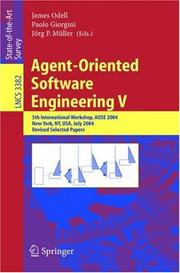
ISBN: 3540242864 3540305785 Year: 2005 Publisher: Berlin, Heidelberg : Springer Berlin Heidelberg : Imprint: Springer,
Abstract | Keywords | Export | Availability | Bookmark
 Loading...
Loading...Choose an application
- Reference Manager
- EndNote
- RefWorks (Direct export to RefWorks)
The explosive growth of application areas such as electronic commerce, enterprise resource planning and mobile computing has profoundly and irreversibly changed our views on software systems. Nowadays, software is to be based on open architectures that continuously change and evolve to accommodate new components and meet new requirements. Software must also operate on different platforms, without recompilation, and with minimal assumptions about its operating environment and its users. Furthermore, software must be robust and ¨ autonomous, capable of serving a naive user with a minimum of overhead and interference. Agent concepts hold great promise for responding to the new realities of software systems. They offer higher-level abstractions and mechanisms which address issues such as knowledge representation and reasoning, communication, coordination, cooperation among heterogeneous and autonomous parties, perception, commitments, goals, beliefs, and intentions, all of which need conceptual modelling. On the one hand, the concrete implementation of these concepts can lead to advanced functionalities, e.g., in inference-based query answering, tra- action control, adaptive workflows, brokering and integration of disparate information sources, and automated communication processes. On the other hand, their rich representational capabilities allow more faithful and flexible treatments of complex organizational processes, leading to more effective requirements analysis and architectural/detailed design.
Software engineering --- Intelligent agents (Computer software) --- Computer Science --- Engineering & Applied Sciences --- Information Technology --- Software Engineering --- Computer science. --- Computer communication systems. --- Software engineering. --- Computer programming. --- Computer logic. --- Artificial intelligence. --- Computer Science. --- Software Engineering/Programming and Operating Systems. --- Software Engineering. --- Artificial Intelligence (incl. Robotics). --- Logics and Meanings of Programs. --- Programming Techniques. --- Computer Communication Networks. --- AI (Artificial intelligence) --- Artificial thinking --- Electronic brains --- Intellectronics --- Intelligence, Artificial --- Intelligent machines --- Machine intelligence --- Thinking, Artificial --- Bionics --- Cognitive science --- Digital computer simulation --- Electronic data processing --- Logic machines --- Machine theory --- Self-organizing systems --- Simulation methods --- Fifth generation computers --- Neural computers --- Computer science logic --- Logic, Symbolic and mathematical --- Computers --- Electronic computer programming --- Electronic digital computers --- Programming (Electronic computers) --- Coding theory --- Computer software engineering --- Engineering --- Communication systems, Computer --- Computer communication systems --- Data networks, Computer --- ECNs (Electronic communication networks) --- Electronic communication networks --- Networks, Computer --- Teleprocessing networks --- Data transmission systems --- Digital communications --- Electronic systems --- Information networks --- Telecommunication --- Cyberinfrastructure --- Network computers --- Informatics --- Science --- Programming --- Distributed processing --- Logic design. --- Artificial Intelligence. --- Design, Logic --- Design of logic systems --- Digital electronics --- Electronic circuit design --- Logic circuits --- Switching theory
| Listing 1 - 10 of 22 | << page >> |
Sort by
|

 Search
Search Feedback
Feedback About
About Help
Help News
News